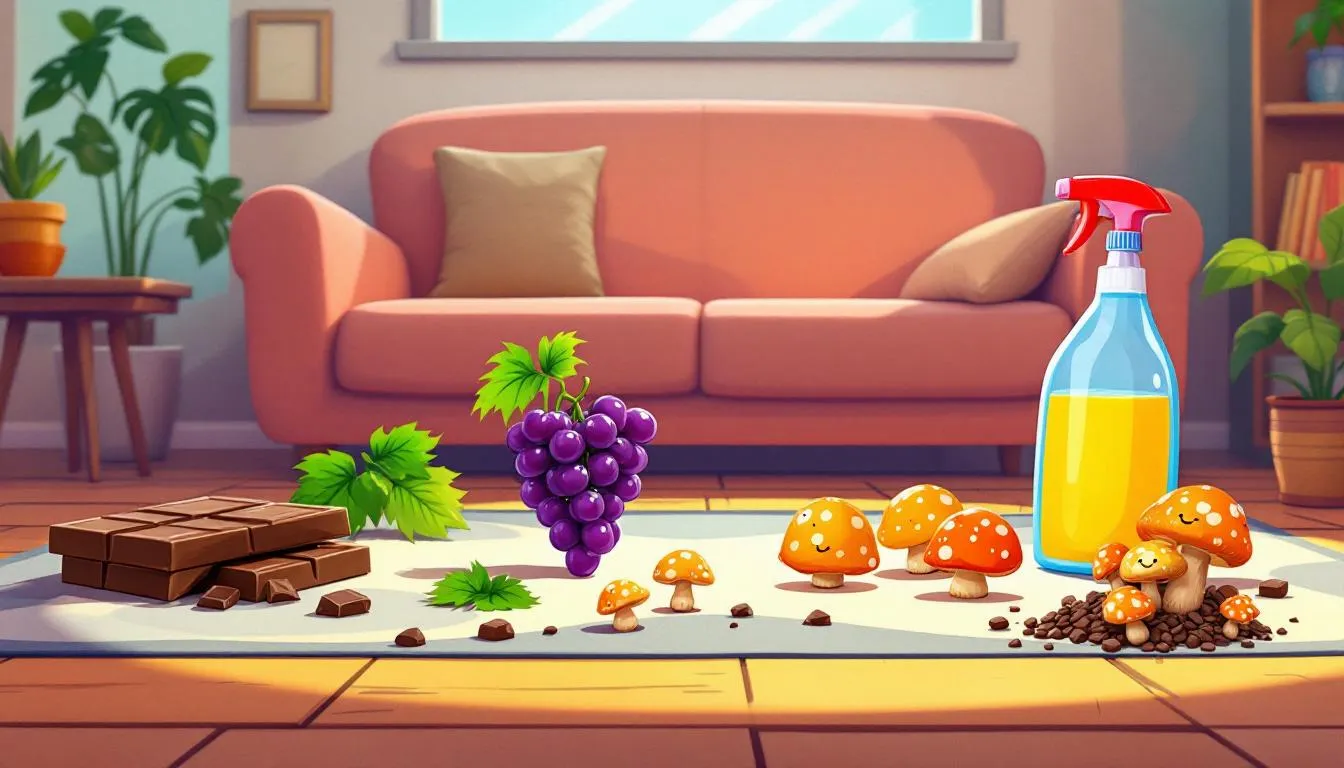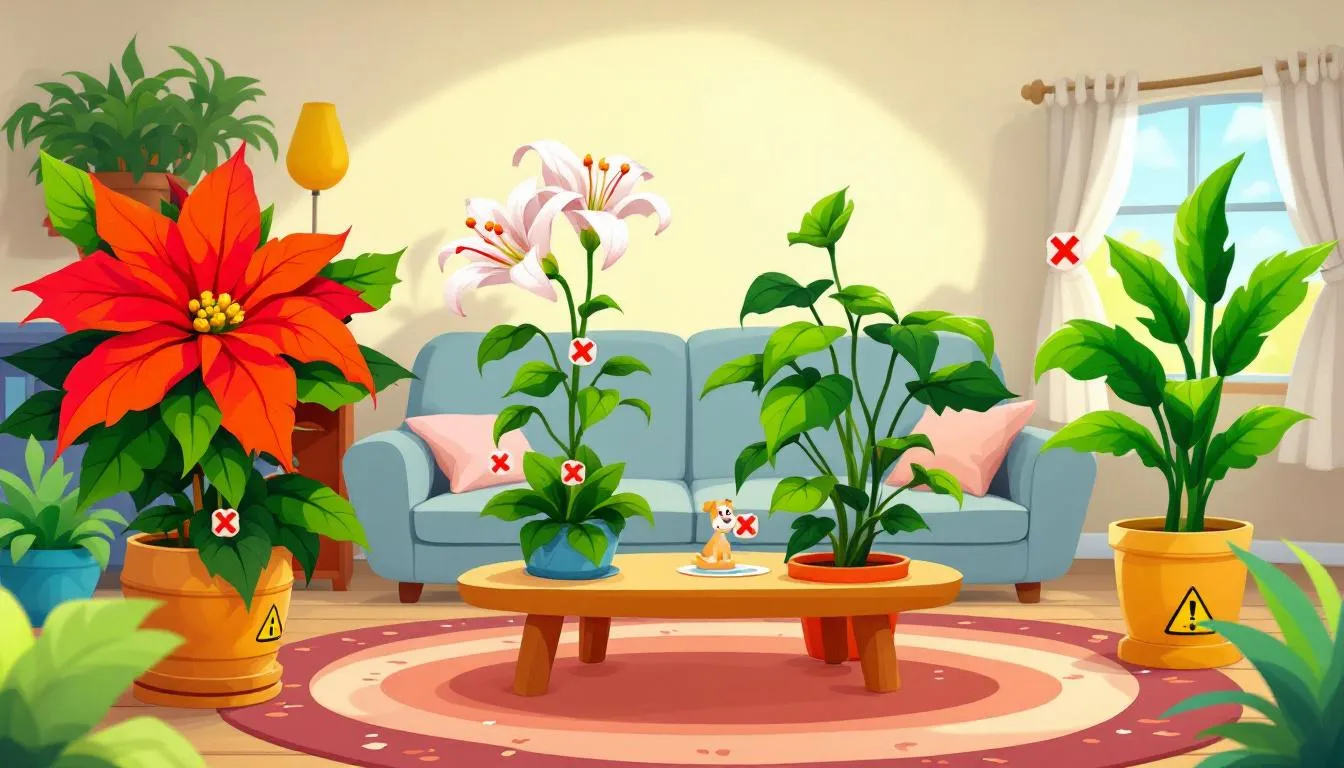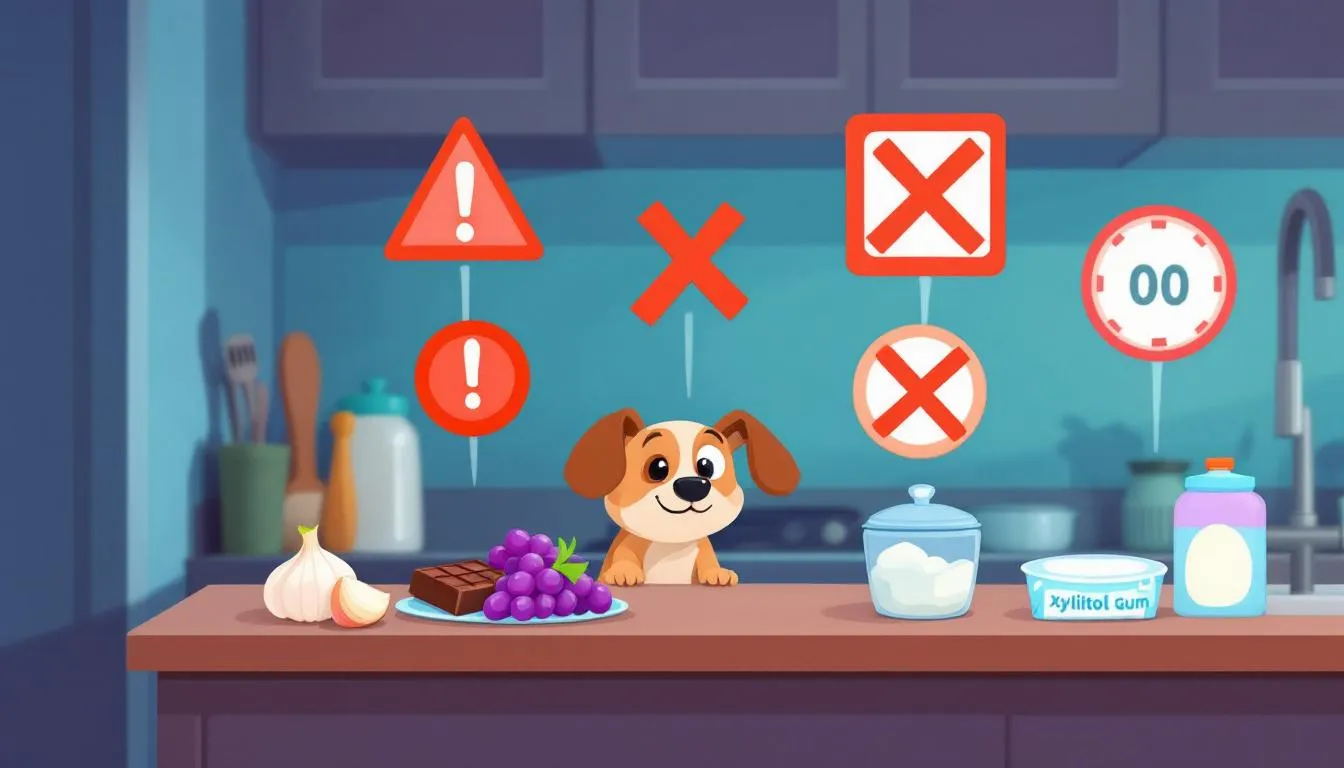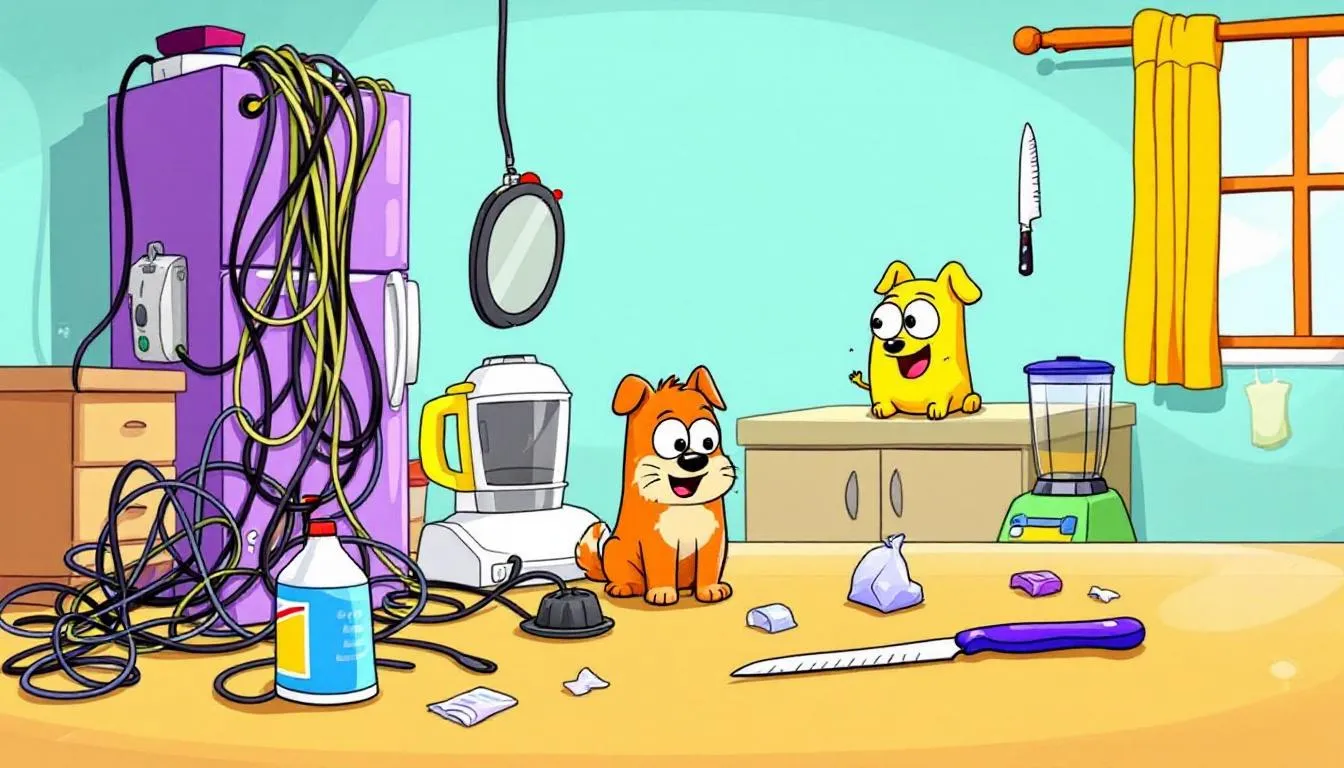Some common household items that are dangerous for pets can be hazardous to them. This guide will help you identify and mitigate those dangers. From everyday foods to houseplants, discover how to keep your furry friends safe.
Key Takeaways
-
Over-the-counter medications and prescription drugs can be lethal to pets; secure storage is essential to prevent accidental ingestion.
-
Many common human foods, such as chocolate, grapes, and onions, are toxic to pets and should never be given as treats.
-
Household items like cleaning products, garden chemicals, and certain plants can pose serious health risks to pets if not stored properly.
Over-the-counter Medications
Over-the-counter medications are a staple in most households, but they can be deadly if ingested by pets. Canine and human medications, including pain relievers, flu remedies, sleeping pills, vitamins, and supplements, can cause significant harm to pets. For instance, nonsteroidal anti-inflammatory drugs, commonly used by humans, can lead to severe health complications if ingested by pets. Acetaminophen, a common pain reliever, can be fatal to cats, emphasizing the need for caution in homes with multiple pets.
To prevent such mishaps, store all medications securely. This includes keeping them in pet-proof cabinets or drawers, out of reach of curious paws. Many drugs used in veterinary medicine are different from human medications, and pet owners should never administer human drugs to pets without veterinary guidance. If a pet accidentally ingests any medication, immediate veterinary attention is crucial.
These preventive measures can safeguard your pets from the hidden dangers of human medications.
Toxic Human Foods

Many human foods are toxic to dogs and cats, leading to severe health issues that can affect dogs. These foods include:
-
Chocolate
-
Grapes and raisins, which can potentially cause kidney damage in dogs
-
Avocado (peel, seeds, pits), which can cause cardiac issues and gastrointestinal distress
-
Onion-family foods
-
Macadamia nuts, which can lead to severe lethargy and increased body temperature
-
Raw bread dough
-
Xylitol or sugar-free gum; xylitol and other artificial sweeteners are often found in baked goods, making them especially risky if left accessible to pets
These foods can cause stomach upset or worse.
To prevent pets from ingesting harmful foods, follow these guidelines:
-
Avoid feeding pets table scraps and toxic human foods.
-
Inform guests about house rules to prevent them from offering harmful foods to your pets.
-
Always store food in covered containers out of your pet’s reach.
-
Be vigilant about what your pets have eaten, especially if you suspect they may have consumed something harmful.
In addition to these, certain common kitchen ingredients pose significant risks:
-
Caffeine, found in coffee and tea, can lead to restlessness, rapid heart rate, and muscle tremors.
-
Nutmeg contains myristicin, which can cause tremors and even seizures.
-
Yeast dough can expand in a pet’s stomach, causing severe pain and potential rupture.
Some toxic substances, such as antifreeze, have a sweet taste that can attract dogs and increase the risk of accidental poisoning.
Store these items securely and out of reach to keep your pets safe.
Prescription Drugs
Prescription drugs, while beneficial to humans, can pose serious health risks to pets if ingested. Particularly dangerous medications include:
-
ADHD medications (e.g., Concerta and Adderall), which contain stimulants that can be life-threatening for pets.
-
Antidepressants, which can cause severe neurological issues such as seizures and tremors.
-
Heart medications like beta-blockers, which can lead to dangerous drops in blood pressure and slow heart rates.
The toxic effects of many prescription drugs are dose dependent, meaning that even small amounts can be especially dangerous for smaller pets.
To prevent accidental ingestion, follow these safety measures:
-
Store all prescription drugs out of pets’ reach, including portable pill containers.
-
Keep medicine bottles tightly closed.
-
Store medicine bottles in high cabinets to ensure your pets’ safety.
Mindful storage of these medications protects your furry friends from harmful effects.
Hazardous Household Plants

Household plants can brighten up a home, but many are toxic to pets. Common toxic houseplants include:
-
Philodendron
-
Snake Plant
-
Peace Lily
-
Sago Palm
These plants can cause various health issues if ingested. Certain flowers, like:
-
Daffodils
-
Azaleas are highly toxic to dogs and can cause severe digestive issues. Mushrooms growing in gardens can also be harmful, with some species being potentially fatal to dogs.
Many of these plants contain toxic compounds that can cause severe health issues or even be fatal to pets if ingested.
Symptoms of plant toxicity in pets can include vomiting, drooling, and lethargy, depending on the type of plant and the amount consumed. Preventing access to hazardous plants can be achieved through training and using plant stands or hanging baskets.
Replace poisonous houseplants with pet-safe alternatives to ensure a safer environment for your pets.
Cleaning Products
Cleaning products are essential for maintaining a clean home, but they can be dangerous for pets. Many household cleaning products contain toxic substances such as:
-
Bleach
-
Chlorine
-
Phenols
These substances can harm pets if ingested or inhaled. Laundry items such as dryer sheets, especially those in powder form, can also be toxic if ingested by pets and should be kept out of reach. To prevent accidental exposure:
-
Opt for pet-safe cleaning products
-
Store toilet bowl cleaners securely in locked cabinets or on high shelves
Always monitor pets during and after cleaning to prevent them from licking surfaces that may still be wet with harmful cleaning chemicals. Cautious use and storage of cleaning products protect your pets from potential harm.
Personal Care Items
Personal care items are a common part of daily life, but many of them can be extremely toxic to dogs if not stored safely. Human medications, such as ADHD medications and antidepressants, are especially dangerous—dogs are extremely sensitive to these substances, and even a small amount can result in a toxic dose. Ingestion may lead to severe vomiting, low blood pressure, kidney failure, or even liver failure, depending on the medication involved.
Sugar-free gum is another personal care item that poses a serious risk. It often contains xylitol, an artificial sweetener that is highly toxic to dogs and can cause rapid liver failure and life-threatening drops in blood sugar. If your dog eats any human medications or sugar-free gum, it’s crucial to act quickly.
To keep your pet safe:
-
Store all personal care items, especially human medications, in secure cabinets out of your dog’s reach.
-
Never leave pills, gum, or other potentially toxic items on counters or in bags where a curious dog might find them.
-
If you suspect your dog ate something toxic, contact the Pet Poison Helpline or your veterinarian immediately for guidance.
Being proactive about storing personal care items can prevent severe health emergencies and keep your dog safe from harm.
Dangerous Garden Chemicals
Garden chemicals, such as fertilizers and pesticides, pose significant poisoning risks to pets. Key points include:
-
Commercial fertilizers may contain harmful chemicals and toxic ingredients that can cause poisoning if ingested by dogs.
-
Even organic fertilizers, despite being labeled as natural, can be dangerous due to components like bone and fish meal.
-
Ingestion of fertilizers can lead to mild gastrointestinal upset or more severe health issues.
Pesticides, including:
-
insect baits
-
snail baits
-
sprays can be extremely harmful to pets. For example, slug pellets contain poisons like iron phosphate, which can lead to severe health outcomes in dogs. Some insecticide baits and rodenticides are specifically formulated to kill mice, but these products can also be highly toxic to pets if ingested.
Ensure pet safety by reading pesticide labels carefully and storing lawn chemicals in locked sheds or garages. Mindfulness of these dangers keeps your garden safe for pets.
Rodent Poisons and Insecticides
Rodent poisons and insecticides are designed to kill pests, but they can be deadly for pets as well. Rat poison can lead to severe health effects in pets, including internal bleeding, high calcium levels, brain swelling, and even death. Symptoms of rat poisoning may include:
-
hyperactivity
-
muscle tremors
-
depression
-
seizures
-
loss of appetite These symptoms can manifest 1-7 days post-ingestion.
Prevent access to rodent poisons by always keeping them out of a dog's reach and considering non-toxic alternatives for pest control. In case of poisoning, effective treatment often involves inducing vomiting and administering activated charcoal.
These preventive measures protect your pets from the hidden dangers of rodent poisons and insecticides.
Nicotine Products
Nicotine products, including e-cigarettes, chewing tobacco, nicotine gum, and nicotine patches, pose significant risks to pets. E-cigarette vaping liquid is particularly dangerous. Even small amounts of nicotine, such as from a single cigarette, can be harmful to dogs. Nicotine poisoning can lead to severe symptoms, including:
-
vomiting
-
depression
-
increased heart rate
-
lower blood pressure
-
seizures
-
respiratory failure
-
death
To keep pets safe, ensure nicotine products are stored out of their reach. If you smoke, doing so outside can minimize your pets’ exposure to harmful chemicals. Caution with nicotine products prevents accidental poisoning and ensures your pets’ well-being.
Harmful Foods and Ingredients

Certain human foods and ingredients are highly toxic to pets, including:
-
Chocolate (baking chocolate, semi-sweet chocolate, and gourmet dark chocolate)
-
Grapes and raisins, which can cause kidney failure
-
Onion-family foods, which can lead to a dangerous form of anemia
-
Macadamia nuts, which can cause weakness, depression, and vomiting
Marijuana products, including edibles and oils, can be extremely dangerous to pets and should always be kept out of their reach.
Xylitol, commonly found in sugar-free gum products, is highly toxic to pets and can cause severe health issues such as hypoglycemia and seizures. To keep your pets safe and healthy:
-
Store toxic human foods securely.
-
Avoid feeding table scraps to your pets to prevent accidental ingestion.
-
Be aware of harmful foods and ingredients that can affect your pets.
Electrical and Tool Hazards
Electrical and tool hazards are often overlooked, but they can be deadly for dogs if not properly managed. Dogs are naturally curious and may be attracted to electrical cords, which can result in severe burns, electric shock, or even respiratory failure if chewed. In addition, cleaning products such as toilet bowl cleaners are toxic to dogs and can cause digestive upset or more serious health issues if ingested.
Other dangers in the home include tools like hammers, screwdrivers, and sharp objects, which can cause physical injuries if left within a dog’s reach. Certain houseplants, such as dumb cane, are also toxic to dogs and can lead to difficulty swallowing and digestive upset. Even seemingly harmless items like petroleum jelly can cause stomach issues if consumed.
To minimize these risks:
-
Keep all electrical cords out of reach or use protective covers to prevent chewing.
-
Store cleaning products, especially toilet bowl cleaners, in locked cabinets or high shelves.
-
Put away tools and sharp objects after use, ensuring they are not accessible to pets.
-
Be aware of other dangers, such as toxic plants and household substances, and keep them away from your dog.
Taking these precautions will help protect your dog from the hidden hazards of everyday household items.
Garbage and Trash Risks
Garbage and trash can be a hidden source of toxic substances and potentially dangerous items for dogs. The smell of discarded food and waste can attract dogs, leading them to eat toxic food or harmful objects. Common culprits found in the trash include grapes and raisins, which can cause kidney failure, and macadamia nuts, which can result in weakness, vomiting, and severe illness. Rat poison, often discarded or left accessible, is especially dangerous and can be fatal if ingested by dogs or other animals.
Dogs may also encounter other toxic items in the trash, such as spoiled food, sharp objects, or cleaning product containers. In severe cases, eating these dangerous items can lead to digestive upset, even seizures, or death.
To keep your dog safe:
-
Use dog-proof trash cans and always keep garbage securely closed.
-
Regularly check your trash for toxic items and dispose of them safely, out of your dog’s reach.
-
Prevent your dog from scavenging in outdoor garbage or compost bins, where harmful substances may be present.
-
If your dog eats something from the trash and you suspect poisoning, contact your veterinarian immediately, as severe cases can escalate quickly.
By staying vigilant and managing your household waste carefully, you can help prevent severe illness and protect your dog’s health and safety.
Miscellaneous Household Dangers

Beyond the more obvious dangers, several miscellaneous household items can pose risks to pets, including other dangers:
-
Raw bread dough can lead to gas buildup and bloating in dogs due to fermentation, potentially causing severe discomfort.
-
Ingesting bar soap can result in digestive issues like diarrhea and vomiting.
-
Sharp or splintered bones can cause blockages or injuries in a dog's digestive tract, leading to serious health complications.
-
Many household items, if ingested, can cause irritation or obstruction in a pet's gastrointestinal tract.
-
Feeding pets raw meat carries risks such as bacterial contamination from Salmonella or E. coli, and can also lead to digestive issues or other health problems.
-
Petroleum jelly may induce diarrhea and possibly vomiting if consumed.
Awareness is key to keeping pets safe from these common household items. Ensuring that potentially dangerous items are stored securely and out of pets’ reach can prevent accidental ingestion and the resulting health issues. Vigilance and proactive measures create a safer environment for your pets.
Emergency Actions for Poisoned Pets
In the unfortunate event that your pet ingests a toxic substance, immediate action is crucial. Contact your vet or a veterinary emergency hospital immediately if you suspect your pet has been poisoned. Be prepared to provide details such as the substance, amount, and time of ingestion. Quick response can make a significant difference in your pet’s health.
For additional support, you can contact the ASPCA Animal Poison Control Center Hotline or the Pet Poison Helpline. These resources can offer guidance on what to do next. In some cases, inducing vomiting and administering activated charcoal may be necessary. However, always follow the advice of a veterinary professional to ensure the best outcome for your pet.
Symptoms of poisoning can vary depending on the substance ingested. Some toxins can affect the central nervous system, leading to symptoms such as tremors, seizures, or loss of coordination. For example, nicotine poisoning can cause gastrointestinal issues and respiratory distress, including difficulty breathing, within 15 to 30 minutes. Inhalation of cleaning products can lead to coughing, sneezing, and respiratory distress. Recognizing symptoms and acting quickly helps mitigate the effects of poisoning and protect your pet’s health.
Summary
In summary, being aware of the common household items that pose risks to pets is crucial for their safety. From over-the-counter medications and toxic foods to prescription drugs and household plants, many everyday items can be dangerous. By taking preventive measures and storing these items securely, you can create a safer environment for your pets.
Remember, your pets rely on you to keep them safe. By staying informed and vigilant, you can prevent accidents and ensure your furry friends live healthy, happy lives. Let’s take action today to protect our pets from the hidden dangers in our homes.
Frequently Asked Questions
What should I do if my pet ingests a toxic substance?
If your pet ingests a toxic substance, immediately contact your veterinarian or a veterinary emergency hospital. Be ready to provide details about the substance, the amount ingested, and the time of ingestion for proper assistance.
Are there any specific foods I should avoid giving my pet?
To ensure your pet's health, avoid giving them chocolate, grapes, raisins, avocado, onion-family foods, macadamia nuts, and raw bread dough. These foods can be toxic and pose serious health risks.
How can I prevent my pet from accessing harmful medications?
To prevent your pet from accessing harmful medications, store all medications in pet-proof cabinets or drawers, ensuring they are out of reach and tightly closed. Keeping them in high cabinets will further reduce the risk of your pet getting into them.
What are some common symptoms of poisoning in pets?
Common symptoms of poisoning in pets include vomiting, drooling, lethargy, seizures, and respiratory distress. If you observe any of these signs, it is crucial to contact your veterinarian immediately.
Are there any resources I can contact for pet poisoning emergencies?
In case of a pet poisoning emergency, you can contact the ASPCA Animal Poison Control Center Hotline at (888) 426-4435 or the Pet Poison Helpline for immediate assistance.


